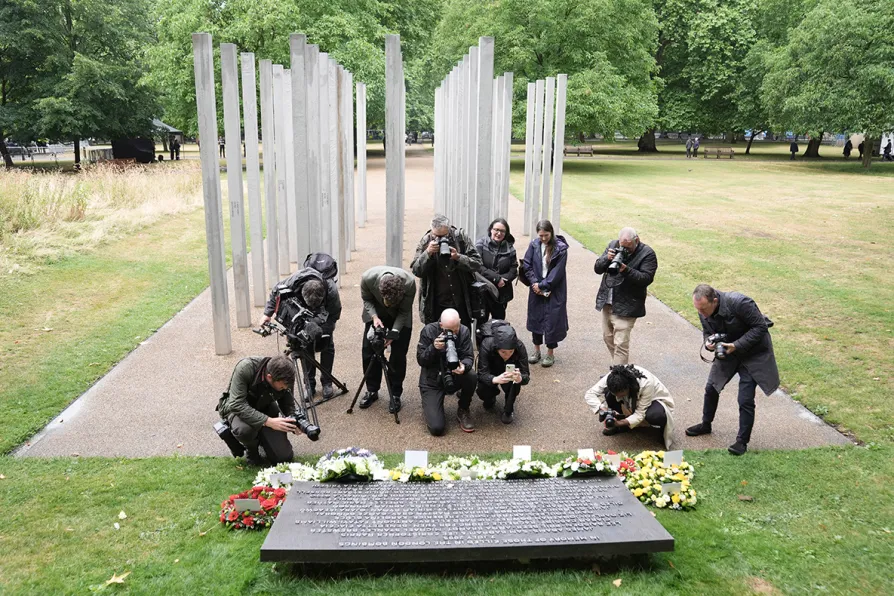
 Members of the press take photographs of wreaths laid by the Mayor of London Sir Sadiq Khan and Prime Minister Sir Keir Starmer at the 7/7 Memorial, in Hyde Park, London, July 7, 2025
Members of the press take photographs of wreaths laid by the Mayor of London Sir Sadiq Khan and Prime Minister Sir Keir Starmer at the 7/7 Memorial, in Hyde Park, London, July 7, 2025
COMMEMORATIONS of the July 7 bombings on their 20th anniversary rightly focus on the victims.
The 52 dead were all British residents but included 20 nationalities, underlining London’s character as a global city: and people of all faiths and none came together that day in the face of the horrific killings.
We should not, however, adopt the ruling-class media’s default position that any attempt to understand the geopolitical framework of an act of terror is somehow to excuse it.
The July 7 bombings were motivated by an extremist Islamism, contemptuous of human life. But where did that ideology come from?
The killers’ statements imply that they were “radicalised” by war crimes in the Middle East, particularly the invasion of Iraq. Yet even this understates the complexity of the British state’s relationship to jihadist terror and the role British foreign policy plays in enabling it.
The “war on terror” launched by George W Bush following the September 11 2001 attacks on New York hugely increased both the appeal and the reach of the al-Qaida terrorist group and its offshoots.
That is clear from the fallout from the invasion of Iraq, which descended into years of sectarian violence, as well as from the wanton assault on Libya, which flooded much of north Africa with heavily armed jihadists, feeding long-running terrorist insurgencies in the Sahel region.
Over time these festering warzones gave birth to an even more extreme outfit, Islamic State (Isis), which at its height overran much of Iraq and Syria.
Though not part of the al-Qaida family, Afghanistan’s Taliban are also back at the helm in that country after a hugely destructive 20-year occupation by US-led forces: the immediate collapse of the US-imposed government after the withdrawal of foreign troops showed how little the “war on terror” had achieved in eliminating its purported targets.
“Purported” because it is clear that the countries attacked in the name of the “war on terror” had nothing to do with the terrorist organisations behind attacks in the West.
The invasion of Iraq was part of a longer-term US strategy for “Balkanising” the Middle East (turning states deemed hostile to US supremacy into unstable, limited-sovereignty entities lacking effective control over their own territory — the current status of Iraq, Syria and Lebanon) that facilitates freer exploitation of their resources by mainly US companies. Guff from the likes of Tony Blair about a hypothetical lash-up between Saddam Hussein and al-Qaida raising the “calculus of risk” was just that: the Iraqi regime had no connection to such groups.
And Western imperialist wars have not just boosted jihadist terror as a by-product: they have often actively promoted it.
In the case of US support for the mojahedin to bring down Afghanistan’s socialist government, or Israel’s historical assistance to Hamas to divide the Palestinian liberation movement, this goes back decades, but it is current as well.
Britain supported radical Islamists in Libya to bring down Gadaffi: one, Salman Abedi, then returned to carry out the deadly Manchester Arena bombing.
It supported an Islamist-dominated revolt against the Assad government in Syria too, and now recognises a former al-Qaida fighter as that country’s president.
Our ruling class plays with fire: safe in the knowledge that when the fanatics it funds and arms turn on us, it will be innocent working-class people who pay the price.
When, after the Manchester Arena bombing, then Labour leader Jeremy Corbyn addressed these geopolitical realities and the way British foreign policy leaves us less safe, polls showed most of the public agreed with him — to the fury of Establishment papers and politicians.
That illustrated that people are ready for grown-up conversations about the causes of the most horrific attacks — and that the arguments of the peace movement are worth making.
In today’s increasingly repressive climate, we need to remember that.
![SHAMELESS DISPLAY OF COERCION: Previously unreleased photos of Guantanamo captives, 2002, brought to Guantanamo Bay from Afghanistan by way of Incirlik, Turkey. [Pic: Staff Sergeant Jeremy Lock/CC]]( https://msd11.gn.apc.org/sites/default/files/styles/low_resolution/public/2025-11/cia%20web2.jpg.webp?itok=SyFt0Pzt)
GUILLERMO THOMAS enjoys a survey of the current state of the CIA (aka Langley) from an expert and insider of sorts

ANDREW MURRAY looks back on the ignominious career of the former US vice-president, who died earlier this week











